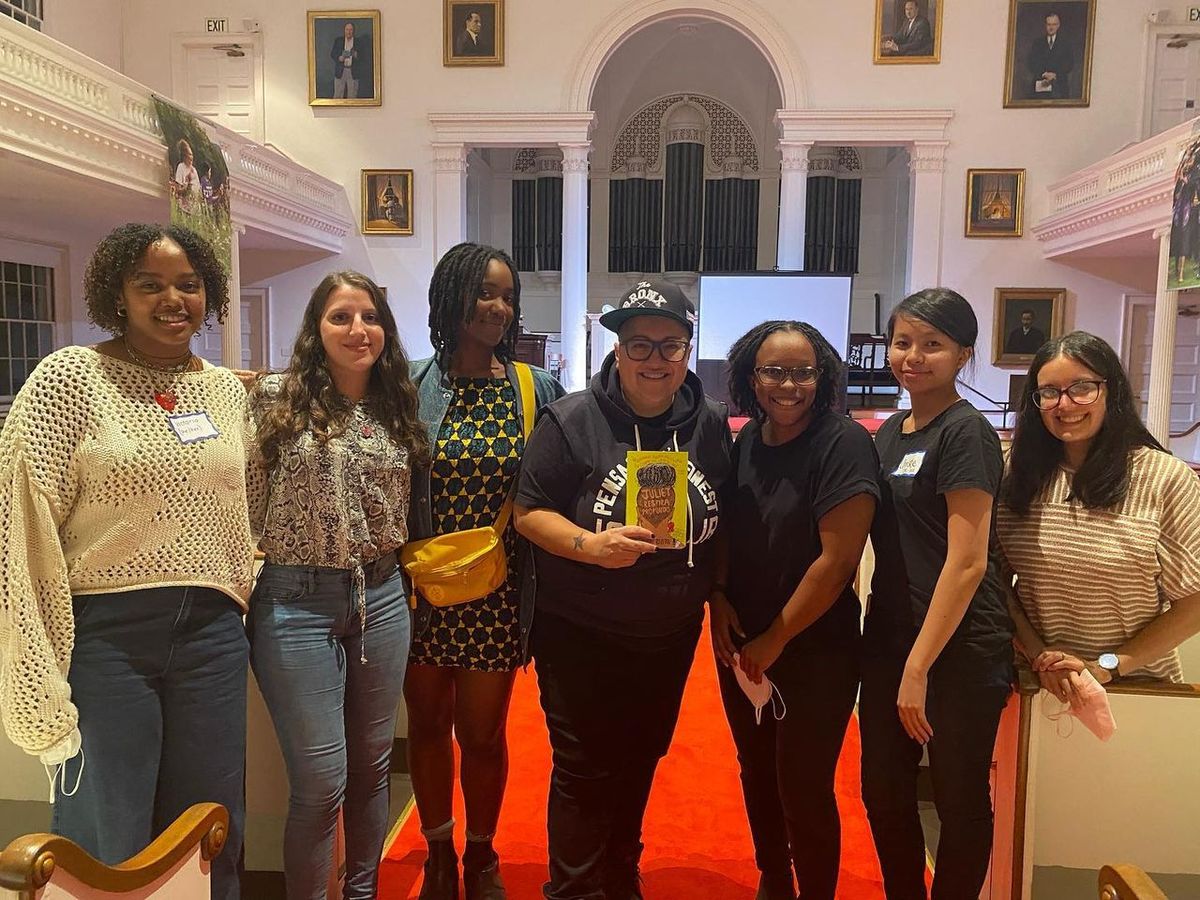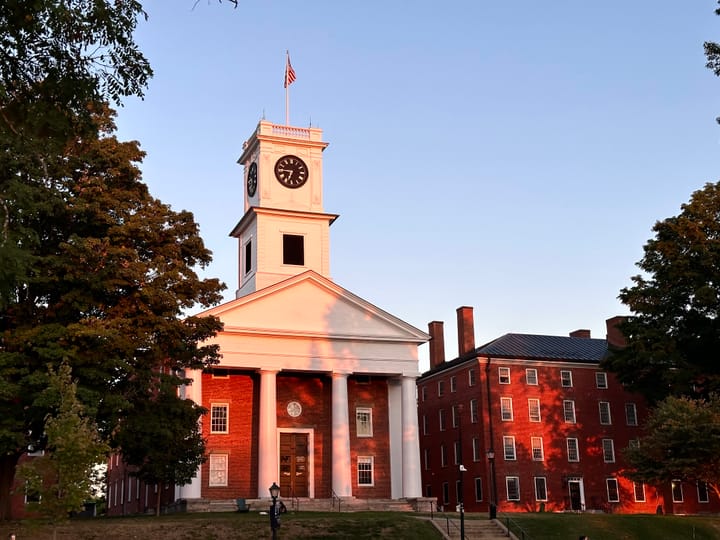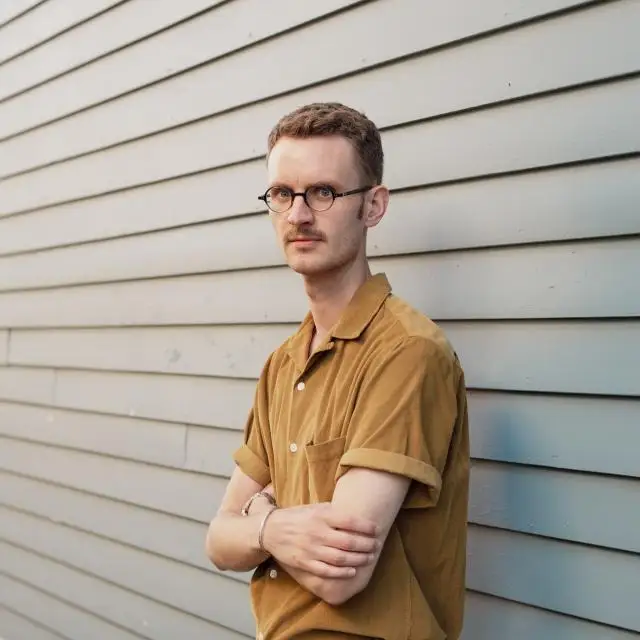MRC Hosts Queer Latinx Author Gabby Rivera for Latinx Heritage Month
On Thursday, Sept. 22, the Multicultural Resource Center (MRC) hosted prominent queer Puerto Rican author and activist Gabby Rivera in Johnson Chapel as its keynote speaker for Latinx Heritage Month.

On Thursday, Sept. 22, the Multicultural Resource Center (MRC) hosted prominent queer Puerto Rican author and activist Gabby Rivera in Johnson Chapel as its keynote speaker for Latinx Heritage Month. During the event, Rivera discussed her tumultuous journey as a writer and the importance of joy, family, and self-care.
The talk covered Rivera’s work and the inspiration behind her famous novel, “Juliet Takes a Breath,” as well as her Marvel Comics series “America,” which features the titular character America Chavez, a queer Latinx superhero.
Although presented by the MRC, the event was planned by a committee consisting of students interested in planning programs for Latinx Heritage Month, with La Causa — the college’s Latinx student affinity group — serving as one of the co-sponsors. All students involved in the planning met and discussed which speaker they’d like to see at the college, ultimately choosing Rivera.
“It was very important to us to have a speaker who could highlight the diversity within Latinx communities, recognizing that the Latinx experience is not a monolithic experience,” said Lupita Mendez, interim director of the MRC. Mendez also emphasized that student voices are necessary to figure out what speakers students are interested in seeing at the college.
Attendees of the event included not only Amherst students, but also students and faculty from neighboring universities. Many students and staff present were fans of Rivera’s work. Others appreciated that the college brought a speaker with typically underrepresented identities to campus, and were excited to hear about her experiences in the queer Latinx community.
Nyla Guadalupe ’23 expressed how much of a fan she was of Rivera’s work, as it made her feel represented as a queer Puerto Rican from the Bronx, just like Rivera herself or her character Juliet, the protagonist in Rivera’s novel “Juliet Takes a Breath.” Representing queer people of color is something Rivera strives to do in her work — something her talk reflected.
Rivera began the talk by mentioning her grandmother, who came to the Bronx from Puerto Rico. Rivera described her as a mentor and an inspiration, touching on the need for support from family. This stood out to Claudeen Gale, a student at UMass Amherst, who reflected that “we have to draw on our ancestors for support and learn directly from their stories.”
Rivera moved on to talk about her first experience with queerness, which took place during the AIDS epidemic that broke out within the gay community in the 1980s and early 1990s. She noted the stigma associated with being gay at the time, and how that made it harder for her to come out as a queer woman.
After coming out to her family, Rivera wrote “Juliet Takes a Breath” as an outlet to tell her coming out story, while also inspiring other queer kids of color who go through similar experiences. Juliet, the novel’s protagonist, is a queer and plus-sized Puerto Rican who lives a bold and beautiful life filled with love for herself and for those around her.
The intersection of these identities was inspiring to readers of the novel and attendees of Rivera’s talk. “I’ve never been to an event where a plus-sized queer person was the focus of the event,” Kate Foster, a graduate student at UMass explained. “For me, it was very nice to see myself represented.”
Rivera said that, though “Juliet Takes a Breath” was written as a love note for queer teens of color, it ended up finding much broader success. Readers connected with Rivera’s story, and the story achieved such success that it was adopted into a graphic novel, with illustrations by artist Celia Moscote. This then led to a direct invite from Marvel Comics to write a series on America Chavez.
America was a character that already existed in the Marvel Comics world — she was created by two white men in 2011. But since the character is a queer Latinx superhero, it was important that the writer be able to bring those identities to life. Rivera did just that and more, adding her own touch to America’s story through the introduction of America’s grandmother, who was inspired by Rivera’s own supportive and loving grandmother.
Todd Bradley, a staff member from UMass who attended the event, expressed his shock when he found out Rivera was the first Latina ever to write for Marvel, starting in 2017.
Rivera made it clear that her experience writing for Marvel was not a walk in the park, facing backlash and toxicity from comic fans who had issues with her interpretation of America Chavez.
Rivera also talked about her experiences with having her personal information publicized against her will and being threatened by fans. If it wasn’t for the support she received from her team and the many fans of her work, she thinks she would have quit. Bradley also noted how inspiring this was, saying, “It is important to be strong in environments that are toxic, because it makes it better for others who want to jump into those positions down the road.”
Rivera ended the talk by explaining the importance of prioritizing joy and self-care. She hosts a podcast titled “Joy Uprising” where she talks with other queer people of color about the importance of joy. Rivera explores how joy can fit into the queer experience, with discussion topics ranging from music and art to love and joy during quarantine times.
Several students mentioned how important it was to hear Rivera talk about self-care. Foster commented on her major takeaway from the talk: “I’m allowed to have joy as a queer person, I don’t have to always be fighting for representation. I’m allowed to relax.”
Guadalupe had similar takeaways, noting how important it was that Rivera was able to talk about her own success as a writer, and expressing that “it allowed me to see someone who holds my identities have a life filled with love and community.”
Mendez said that the MRC hopes to continue bringing speakers in celebration of other cultural heritage months, and advancing conversations regarding racial equality and justice.





Comments ()